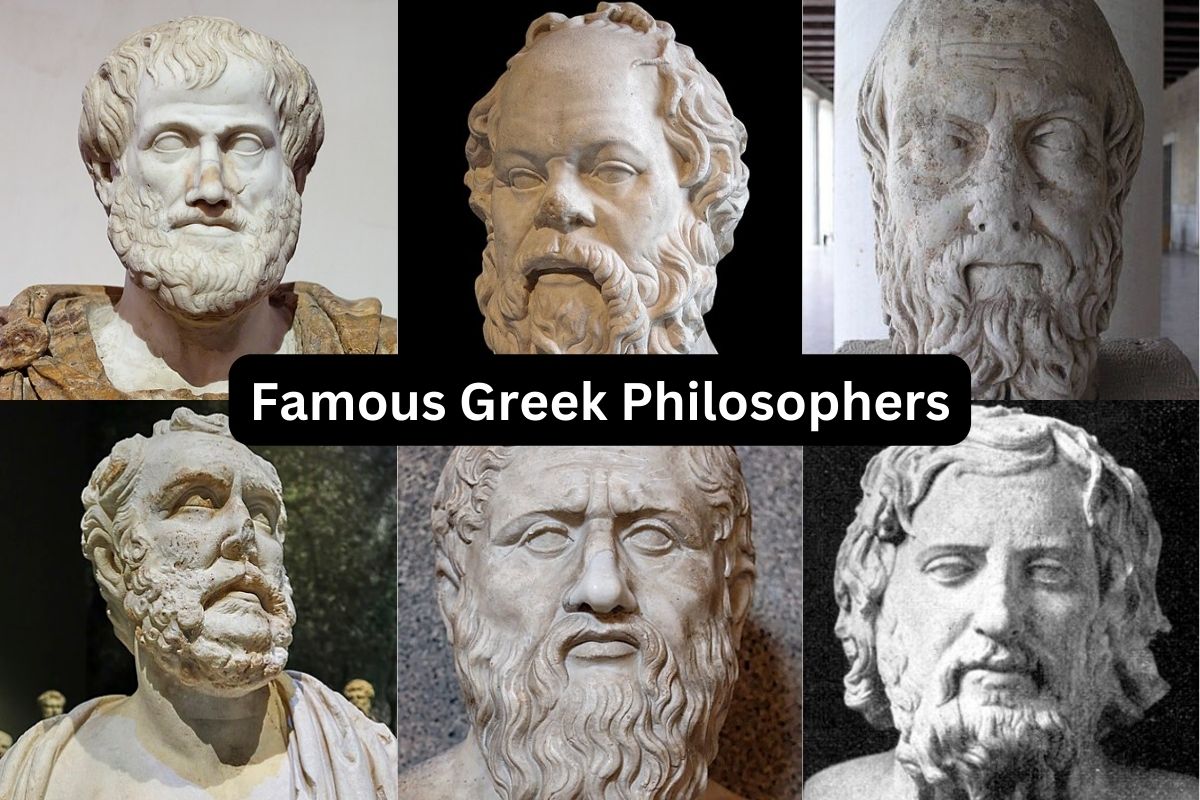Ancient Greek philosophers were some of the most influential thinkers in Western civilization. They lived in ancient Greece from the 6th century BCE to the 4th century BCE and their ideas and teachings have had a profound impact on modern philosophy, politics, science, and culture.
Greek philosophers were concerned with questions about the nature of reality, the purpose of life, ethics, politics, and the role of human beings in the world.
Some of the most famous ancient Greek philosophers include:
- Socrates
- Plato
- Aristotle
- Thales of Miletus
- Xenophon
Their ideas and teachings continue to be studied and debated today, making them enduring figures in the history of human thought.
Famous Greek Philosophers
1. Socrates

Socrates was an ancient Greek philosopher who lived in Athens during the 5th century BCE. He is considered one of the most important figures in the development of Western philosophy. Socrates did not write any of his ideas down, but his teachings were recorded by his students, including Plato.
Also Read: Socrates Facts
Socrates is known for his method of questioning, which is called the Socratic method. He believed that by questioning assumptions and beliefs, people could arrive at a deeper understanding of truth and wisdom.
He believed that knowledge and virtue were closely linked, and that the pursuit of knowledge and self-examination were essential to a good life.
Also Read: Famous Female Philosophers
Socrates was also known for his critical views of Athenian society and politics. He was accused of corrupting the youth and challenging the authority of the gods, and was sentenced to death by drinking hemlock in 399 BCE.
Despite his death, Socrates’ ideas and teachings continued to influence later philosophers such as Plato and Aristotle. He is remembered as a champion of reason, ethics, and the pursuit of knowledge, and his legacy continues to inspire critical thinking and self-examination today.
2. Plato

Plato was an ancient Greek philosopher who lived in Athens during the 4th century BCE. He was a student of Socrates and went on to become one of the most important figures in Western philosophy. Plato wrote extensively on a wide range of subjects, including ethics, politics, metaphysics, epistemology, and aesthetics.
Plato is known for his theory of Forms or Ideas, which posits that there are eternal, abstract entities that exist beyond the physical world and are the true objects of knowledge.
He believed that the physical world is a shadow or imitation of the true world of Forms, and that knowledge and understanding come from contemplating and understanding these Forms.
Plato also believed in the concept of the philosopher-king, or the idea that the best rulers were those who possessed wisdom, knowledge, and virtue. He wrote extensively on the nature of justice, arguing that it was the foundation of a just society.
Plato founded the Academy in Athens, which was one of the first institutions of higher learning in the Western world. His ideas and teachings have had a profound impact on Western philosophy and continue to be studied and debated today.
3. Aristotle

Aristotle was an ancient Greek philosopher who lived in Athens during the 4th century BCE. He was a student of Plato and went on to become one of the most important figures in Western philosophy, as well as a scientist and a teacher.
Also Read: Aristotle Facts
Aristotle wrote extensively on a wide range of subjects, including metaphysics, ethics, politics, biology, and logic. He believed that knowledge came from observation and experience, and that reason was the foundation of understanding the natural world.
Aristotle’s philosophy emphasized the importance of living a virtuous life and finding a balance between extremes. He believed that the best way to achieve happiness and fulfillment was to live a life of moderation and self-control.
Aristotle also believed in the concept of causality, which holds that everything in the natural world has a cause and effect relationship. He is often referred to as the founder of formal logic, and his work on syllogisms and deductive reasoning has had a significant impact on Western philosophy and scientific inquiry.
Aristotle’s ideas and teachings have had a profound impact on Western philosophy, science, and culture, and his work continues to be studied and debated today.
4. Thales of Miletus
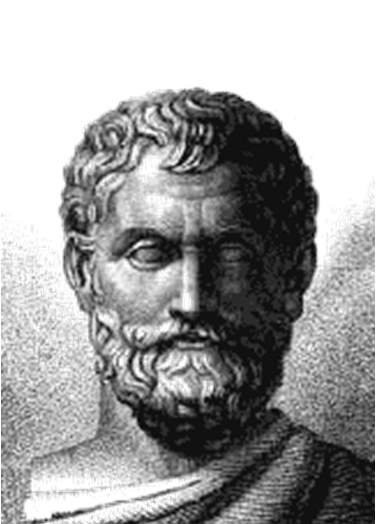
Thales of Miletus was an ancient Greek philosopher who lived in the 6th century BCE. He is widely considered to be one of the first philosophers in Western history, and is known for his contributions to the fields of mathematics, astronomy, and philosophy.
Thales believed that everything in the world was made of water, and that water was the fundamental substance that gave rise to all other things.
He was also known for his mathematical knowledge, and is credited with several mathematical discoveries, including the use of geometry to calculate the height of pyramids and the measurement of the distance of ships from the shore.
Thales was interested in explaining natural phenomena without resorting to supernatural explanations, and he believed that everything in the world could be explained through natural causes. He is also credited with introducing the concept of logical reasoning to philosophy.
Thales’ work laid the foundation for the development of Greek philosophy, and his ideas were built upon by later philosophers, including Anaximander, Anaximenes, and Heraclitus. His contributions to mathematics and science also had a lasting impact, and his work helped pave the way for the scientific discoveries of later civilizations.
5. Xenophon
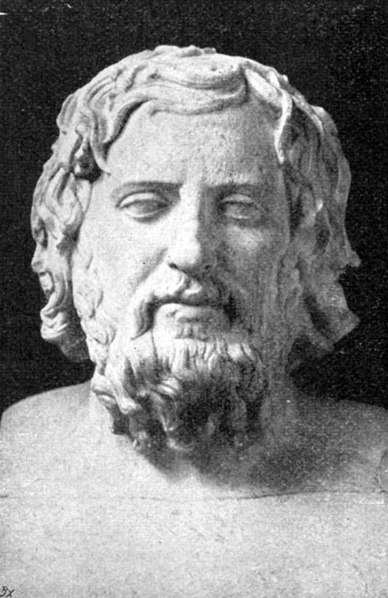
Xenophon was an ancient Greek philosopher, historian, and soldier who lived in Athens during the 4th century BCE. He is known for his writings on a wide range of subjects, including history, politics, philosophy, and military tactics.
Xenophon was a student of Socrates, and his writings often reflect Socratic themes and ideas. He is best known for his work “Anabasis,” which chronicles the journey of a group of Greek soldiers through Persia and back to Greece after the failed campaign of Cyrus the Younger.
In addition to his military and historical writings, Xenophon also wrote on topics such as ethics, politics, and economics. He believed that good governance required the cultivation of virtue and the practice of self-control, and he advocated for a strong and stable government that could provide for the needs of its citizens.
Xenophon’s works were widely read and admired in the ancient world, and his influence can be seen in later philosophical and historical writing. His ideas on the virtues of good governance and the importance of ethical leadership continue to be relevant today.
6. Apollodorus of Athens
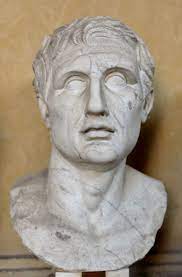
Apollodorus of Athens was an ancient Greek historian who lived in the 2nd century BCE. He is known for his work “Library,” which was a comprehensive guide to Greek mythology and contained a wealth of information on Greek history and culture.
“Library” is a large compendium of mythological stories, including those of the gods and heroes of ancient Greece. It also contains genealogies of many important mythological figures, as well as descriptions of the various cults and religious practices of ancient Greece.
Apollodorus was known for his attention to detail and his meticulous research. He was a scholar of mythology and history, and his work was widely read and influential in the ancient world. His writing was also admired for its clarity and accessibility, and it became a popular reference work for writers and poets in later centuries.
Today, “Library” is considered a valuable resource for scholars of ancient Greek mythology and history, and it continues to be studied and debated for its insights into the culture and beliefs of ancient Greece.
7. Hecataeus of Abdera
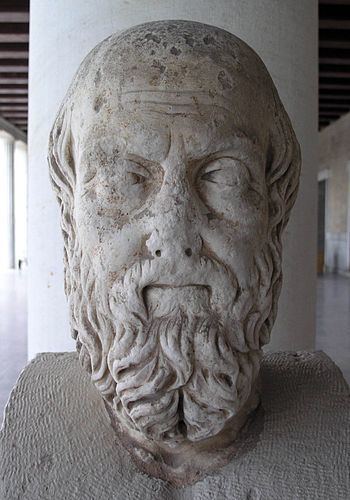
Hecataeus of Abdera was an ancient Greek philosopher and historian who lived in the 4th century BCE. He is known for his work on geography, history, and philosophy.
Hecataeus believed that the world was divided into two parts, Asia and Europe, and that these two continents were separated by the Black Sea. He also believed that the world was round, a concept that was considered radical at the time.
Hecataeus was interested in the history and mythology of ancient Greece, and he wrote extensively on these topics. He believed that history was a valuable tool for understanding the present, and he emphasized the importance of studying the past in order to learn from it.
Hecataeus also wrote on philosophy, and he was known for his belief in the power of reason and his skepticism of religious dogma. He believed that people should rely on their own reason and judgment to understand the world around them, rather than blindly accepting the beliefs of others.
Hecataeus’ ideas and writings were influential in the ancient world, and his work on geography and history laid the foundation for later scholars in these fields. His emphasis on reason and critical thinking also had a lasting impact on Western philosophy and intellectual history.
8. Demetrius Lacon
Demetrius Lacon was an ancient Greek philosopher who lived in the 3rd century BCE. He was from the city-state of Sparta and was a student of the philosopher Theophrastus, who was himself a student of Aristotle.
Demetrius Lacon was known for his teachings on ethics and morality, and he emphasized the importance of living a virtuous life. He believed that happiness and fulfillment could be achieved by living a life of self-control and moderation.
Demetrius Lacon also wrote on the subject of rhetoric, which was an important area of study in ancient Greece. He believed that rhetoric could be used for good or for evil, and that it was the responsibility of the speaker to use rhetoric in an ethical and moral way.
Demetrius Lacon’s teachings on ethics and rhetoric were influential in the ancient world, and his ideas on the importance of virtue and moral responsibility continue to be relevant today. His work on rhetoric also had a lasting impact, and his ideas on the ethical use of language and persuasion are still studied and debated by scholars today.
9. Ion of Chios
on of Chios was an ancient Greek philosopher and poet who lived in the 5th century BCE. He was known for his work on the subject of poetry and its relationship to philosophy and morality.
Ion believed that poetry had the power to inspire and educate people, and he saw it as a valuable tool for teaching moral values and virtues. He believed that poets had a responsibility to use their art to promote ethical behavior and to inspire their audience to strive for goodness and virtue.
Ion also believed that philosophy and poetry were closely linked, and that poetry could be used to illustrate and reinforce philosophical ideas. He saw poetry as a way to communicate complex philosophical concepts in a way that was accessible and meaningful to a wider audience.
Ion’s ideas on the relationship between poetry and philosophy were influential in the ancient world, and his work had a lasting impact on the development of Greek literature and philosophy. His ideas on the ethical responsibility of poets and the role of art in promoting moral values continue to be relevant today.
10. Polemon of Athens
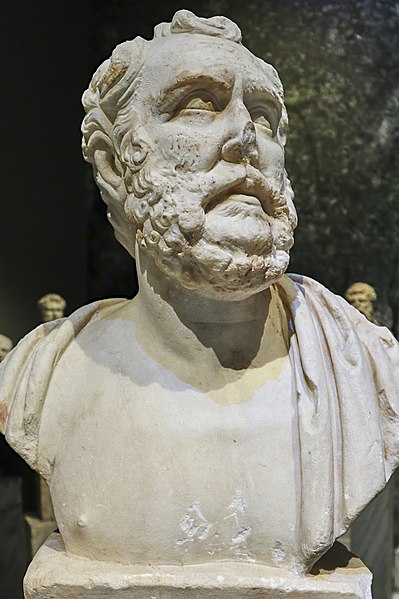
Polemon of Athens was an ancient Greek philosopher who lived in the 4th century BCE. He was a student of Xenocrates, who was himself a student of Plato, and he became the head of the Academy in Athens after the death of Crates of Athens.
Polemon believed that philosophy was a way of life, and that the pursuit of wisdom and understanding was essential to a good life. He emphasized the importance of ethics and morality, and believed that living a virtuous life was the key to happiness and fulfillment.
Polemon also believed that philosophy could be used to guide society and promote good governance. He saw the role of the philosopher as that of a teacher and advisor, helping leaders to make wise and just decisions for the benefit of all.
Polemon’s ideas on the relationship between philosophy and ethics were influential in the ancient world, and his work had a lasting impact on the development of Greek philosophy and political theory. His emphasis on the importance of morality and virtue continue to be relevant today, and his ideas on the role of philosophy in governance continue to be studied and debated.
